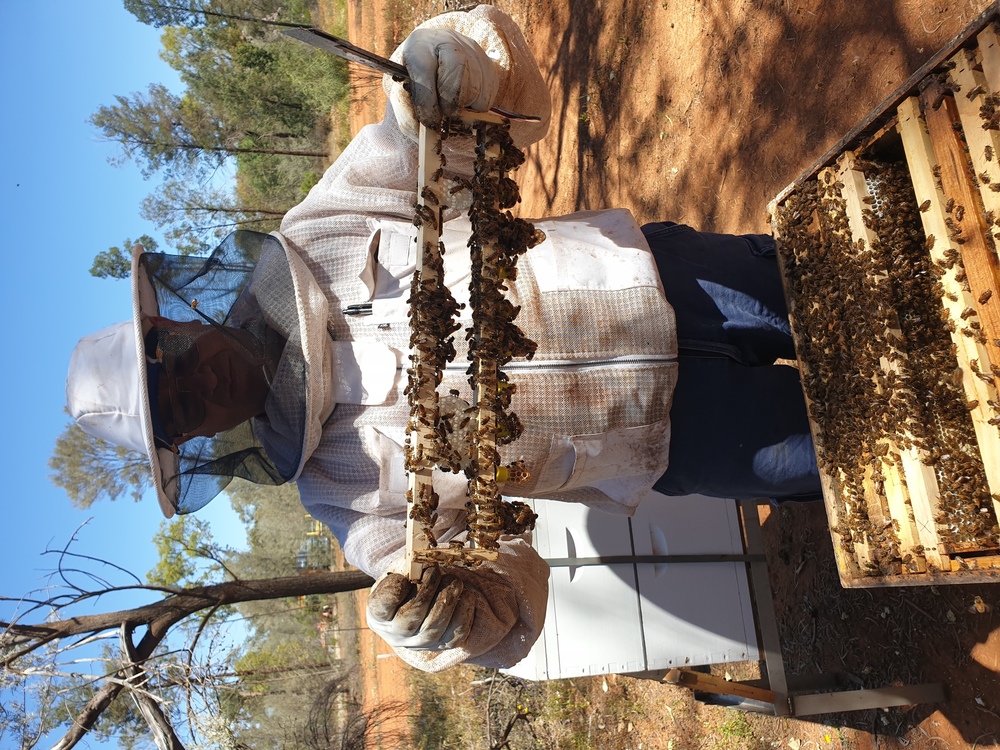Beekeepers get the job done under new varroa orders
Laura Williams
15 September 2022, 9:10 PM
 Lil and Michael Garbutt of Garbamir Honey have been lucky to avoid some of the brunt of the Varroa Mite. (Supplied)
Lil and Michael Garbutt of Garbamir Honey have been lucky to avoid some of the brunt of the Varroa Mite. (Supplied)Surveillance of the Varroa Mite has changed tune as of today, handing more flexibility back to local beekeepers by issuing a new emergency order which asks beekeepers to practice self-surveillance when it comes to protecting their hives.
The new Varroa Mite Emergency Order, which is effective as of today, will increase surveillance that registered beekeepers are required to conduct each year.
Cobar-based apiarist and owner of Garbamir Honey Michael Garbutt said that all good beekeepers should already be doing consistent checks.
“Every registered beekeeper is required to do two Varroa Mite checks a year as part of the biosecurity requirements,” Mr Garbutt said.
Under the new requirements, checks will need to take place every 16 weeks.
While Varroa Mite checks take various forms - some destructive and some non-destructive - all beekeepers will have to use the one method.
“The alcohol wash is a destructive method of protecting the bees…it’s 300 bees in a round of alcohol which dislodges the mites and then you count them. It kills the bees and the mites,” Mr Garbutt said.
For Garbamir Honey, while the alcohol-wash method of testing isn’t preferred, the destruction of 300 bees amongst their some 300,000 won't be a detrimental loss to their business.
Each bee hive can have up to 10,000 bees, with the queen bee laying one to two thousand eggs per day.
“They build up pretty quickly…if you had a very weak hive it would impact them but if you have a nice healthy hive it wouldn’t really impact them that much,” Mr Garbutt said.

Checking out the Cobar-based bees. (Supplied)
Since the Varroa Mite debacle began, the Cobar apiarists are lucky to have been isolated from any impacted zones, meaning there hasn’t been any destruction of hives.
The team have, however, been unable to transport hives outside of their zone.
Minister for Agriculture Dugald Saunders said that the new orders should give beekeepers more flexibility while maintaining strong biosecurity.
“The surveillance undertaken as part of the Varroa response, combined with the surveillance as hives moved to pollination, help provide greater confidence about the extent of the current incursion,” Mr Saunders said.
The new Order also allows registered commercial beekeepers in the blue general emergency zone to move or sell queens (and escort bees), or queen cells, to another registered beekeeper, within the blue general zone or the purple surveillance emergency zone.
All beekeepers within the Western Plains fall into the Blue Zone.
Queen breeders must complete training, comply with alcohol wash requirements, and keep records of sales.
“We are committed to working with industry and the community to eradicate Varroa mite in NSW, while doing so in a way that allows industry to continue normal operations where it is safe to do so,” Mr Saunders said.
Beekeepers can report results of alcohol washes to NSW DPI by calling 1800 084 881 or via the online form at www.dpi.nsw.gov.au/alcohol-wash.




